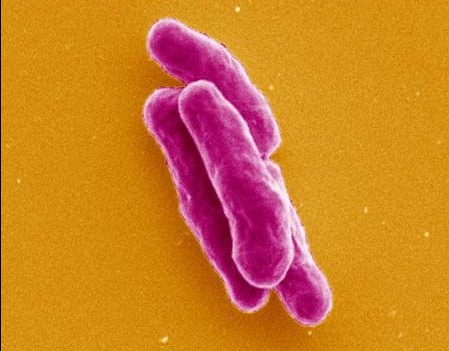摘要:抗结核病药物吡嗪酰胺(或称PZA)扮演着一个独特的显著缩短疗程的角色,尽管研究人员从来不知道其原委。一项新的研究终于找到了PZA在结核分枝杆菌(即该病的致病菌)上的标靶,并提出了该药究竟是如何消灭这些细菌的。
Wanliang Shi 及其同事发现,当PZA水解成为吡嗪酸(或称POA)之后,它会将核糖体蛋白RpsA作为其标靶,而RpsA会参与蛋白质的翻译过程。这种反式翻译过程对细菌在应激情况下(如饥饿、酸性pH值和缺氧等情况下)处理受损mRNA上的停止运作的核糖体是至关重要的。
研究人员提示,PZA能够抑制这一过程可能是其成功治疗结核病的秘密。这种特别的抗结核药物是结核病疗法中唯一无法替换的药物,因为它能杀灭那些其它药物无法消灭的持久性的细菌。因此,目前抗结核病的所有候选药物都将与PZA合并使用以取得最佳的疗效。

结核分枝杆菌
生物探索推荐英文论文摘要:
Pyrazinamide Inhibits Trans-Translation in Mycobacterium tuberculosis
ABSTRACT
Pyrazinamide (PZA) is a first-line tuberculosis drug that plays a unique role in shortening the duration of tuberculosis chemotherapy. PZA is hydrolyzed intracellularly to pyrazinoic acid (POA) by pyrazinamidase (PZase, encoded by pncA), an enzyme frequently lost in PZA-resistant strains, but the target of POA in Mycobacterium tuberculosis has remained elusive. Here, we identify a new target of POA as the ribosomal protein S1 (RpsA), a vital protein involved in protein translation and the ribosome-sparing process of trans-translation. Three PZA-resistant clinical isolates without pncA mutation harbored RpsA mutations. RpsA overexpression conferred increased PZA resistance, and we confirmed that POA bound to RpsA (but not a clinically identified ΔAla mutant) and subsequently inhibited trans-translation rather than canonical translation. Trans-translation is essential for freeing scarce ribosomes in nonreplicating organisms, and its inhibition may explain the ability of PZA to eradicate persisting organisms.







